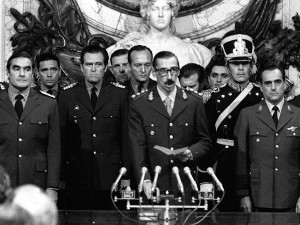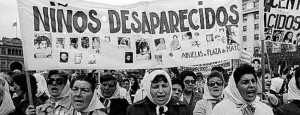Argentina and the Dirty War: A Path to Reconciliation?
By not continuing to address the past, the Argentinian people have been forced to bottle up their emotions and anger, until it boiled over with the election of Kirchner. This has created an unhealthy obsession with the past that is being relived in intrusive ways[1]. Where the people publicly shame people involved in the Dirty War. Rather, than pitting people against each other, it would be best to memorialize the victims and create a sense of understanding. If memorialization is too subdued then another round of truth commissions should be considered.
The current subversive political demonstrations are unable to gain any real, unifying truth. It is by the continual labeling of people as enemies, this notion that your neighbor or friend could have been involved in the Dirty War that is keeping society divided. In fact, whereas the Dirty War used to be labeled as state terrorism, there has now been a push to label it as genocide. Labeling these acts as genocide perpetuates the problem and does nothing to bring peace to the people.[2] In a whole, the quest for human rights has created a divisionary aspect, where it should be creating unification. Some scholars argue that there is,” internal debate about its role under a democratic regime and revealing its internal cleavages and heterogeneities.”[3] In order for Argentina to move on it should look at countries such as South Africa, where truth commissions were effective and society for the most part has moved on. If Argentina truly wants to see the benefits it should tone down its public shaming and blame game, to a more respected, effective judicial involvement[4].
Argentina has had a horrifying, brutal past this is for certain. Closely following the general Latin America model, Argentina went through multiple dictatorships and civilian governments. Yet, there is no doubt that Argentina needs to come to grips with their past before they can become a full focused, healthy democracy. By keeping these protests alive, they are creating an immense divide in the country that promotes violence instead of peace. The process of remembering human rights violations is a difficult one, one in which it seems no right can be made. By looking at other countries path to healing and accepting, Argentina should begin to see that peace can and will eventually come after the problem has been addressed correctly. The old adage rings true, forgiven but not forgotten. It is up to Argentina to forgive so that the victims can be rightly remembered.
[1] “From Dirty War to Genocide: Argentina’s Resistance to National Reconciliation.” Memory Studies, no. 5 (2012): 305-215.
[2] Ibid.
[3] Jelin, Elizabeth. “The Politics Of Memory: The Human Rights Movement And The Construction Of Democracy In Argentina.” Latin American Perspectives 22, no. 81 (1994): 38-58. Accessed April 20, 2015. http://www.latinamericanstudies.org/argentina/human-rights.pdf.
[4] “From Dirty War to Genocide: Argentina’s Resistance to National Reconciliation.” Memory Studies, no. 5 (2012): 305-215.

